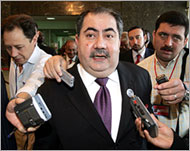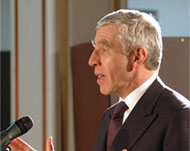Mubarak’s Shia remarks stir anger
The Egyptian president has angered Iraqi leaders by saying Shias there and across the Middle East are more loyal to Iran than to their own countries.

The flap is the latest sign of new tensions between Arab countries – alarmed by Shia and Kurdish domination of Iraq and Iraqis who say they are not getting enough support from other Arabs.
For Shias around the region, Hosni Mubarak’s remarks hinted at Sunni-led Arab governments lining up against their community.
In an interview broadcast on Saturday evening by Al-Arabiya television, Mubarak said: “Definitely Iran has influence on Shias. Shias are 65% of the Iraqis … . Most of the Shias are loyal to Iran, and not to the countries they are living in.”
He said civil war “has almost started” in Iraq.
The interview startled not only Iraqis, but also Shias who form a majority in Iraq and Iran. Shias have minorities in Saudi Arabia, Kuwait, Lebanon and Yemen.
The comments are “the engine which drives the whole region towards civil war”, Fouad Ibrahim, a prominent Saudi Shia writer, told AP from his exile in London.
Tiny minority
Shias as a sect form a minority in the Muslim world; they are estimated at 15%-20% of the Muslims around the world.
 |
|
Zebari blamed the rising Iranian |
Mansour al-Jamry, the editor of the Bahraini daily Al-Wasat and a Shia, said the remarks “encourage those who have an interest in dividing the (Arab) nation”.
“We do not beg for certificates of allegiance to our countries from Mubarak or others,” Kuwaiti Shia lawmaker Hassan Jawhar said in a news conference in parliament.
Jalal Talabani, the Kurdish president of Iraq, said on Sunday that Mubarak’s comments were not accurate.
“It is true that there are some kind of clashes among Sunnis and Shias. But it is not civil war. I think Iraqi people in general are against civil war and there is no chance for any civil war,” he told Britain‘s Channel 4 News.
Denial
Jack Straw, the UK foreign secretary, reiterated his government’s stance of denying that civil war in Iraq was imminent or inevitable but said the situation was “very serious”.
He said claims of an imminent civil war were “frustrating” given that Iraq was on the verge of installing a democratic and permanent government. But the process was taking “too long”, he told the BBC’s Sunday AM programme.
 |
|
Straw says civil conflict in Iraq is |
Mubarak rarely has commented on the situation in Iraq – and usually his statements are broad and vague expressions of concern over violence and political turmoil.
Arab leaders generally avoid criticisms of fellow leaders.
Mubarak’s spokesman, Suleiman Awad, tried on Sunday to soften the impact. He said the president was talking about Shia sympathy with Iran “in view of its hosting of (Shia) holy shrines”.
“The president’s statement about Iraq was only reflecting his increasing worries about the deteriorating situation and his keenness to maintain Iraq‘s national unity,” Awad said in a statement carried by the state news agency, MENA.
Annoyed
Iraq’s interim leaders said they were “annoyed” by Mubarak’s remarks.
“This is a stab in their (Shia’s) patriotism and their civilisation,” Iraq‘s three highest ranked Kurdish, Shia and Sunni Arab leaders – Talabani, Ibrahim al-Jaafari, the prime minister, and Adnan Pachachi, the parliament speaker – said in a joint statement on Sunday.
|
“We do not beg for certificates of allegiance to our countries from Mubarak or others”. Hassan Jawhar, |
Talabani later told Iraqi television: “Reality and historical facts show that the Shias always have been patriotic and genuine Iraqis.
“This unfair accusation against Shia is baseless,” he said.
Hoshyar Zebari, the Iraqi foreign minister, complained to his Egyptian counterpart, Ahmed Aboul Gheit, about Mubarak’s remarks, an Iraqi diplomat in Cairo said, speaking on condition of anonymity because he was not authorised to release the information.
Blame
Last month, Zebari lashed out at Arab leaders in a summit in Sudan’s capital – that Mubarak did not attend – telling them they were to blame if Iran had influence because they had not supported Iraq since Saddam Hussein’s fall in 2003.
He pointed to their failure to follow through on promises to send ambassadors to Baghdad.
 |
|
Talabani (C), al-Jaafari (L) and |
Arab nations appear increasingly worried about Iranian influence in Iraq.
Last year, Jordan‘s King Abdullah II said Iran was seeking to create “a Shia crescent” that would disrupt the balance of power in the region.
Saud al-Faisal, the Saudi foreign minister, made similar comments.
Arab leaders at the Khartoum, Sudan, summit deep concern over plans for US-Iranian talks over Iraq, fearing that meant they could no more have a say in the country.
Arab governments are countering by trying to form their own united stance on Iraq. Arab foreign ministers are to meet in Cairo on Wednesday to discuss Iraq.
Intelligence tie-up
Last week, Arab diplomats told The Associated Press that top intelligence officers from several Arab countries and Turkey had been meeting secretly to co-ordinate their governments’ strategies in case civil war erupted in Iraq, and to block Iranian interference.
Turkey, a non-Arab Sunni Muslim nation bordering Iraq, is worried about Iraq‘s split into sectarian and ethnic entities that will give rise to Kurdish ambitions for independence.
The Cairo-based Arab League is also planning a meeting of leaders of the Iraqi factions in June.